Revealed: How sugar really affects your body
Sugar: the inside story

siamionau pavel/Shutterstock
Who doesn't love a little sugar? We humans are hard-wired to seek out the sweet stuff; the energy we get from carbohydrates (including sugars) fuels much of what we do. And, thanks to our cravings – and the fact that sweet treats are more widely available than ever before – we often consume more sugar than is good for us. But what actually happens to our bodies when we eat sugar and sugary foods? Here, with the help of a registered nutritionist and the latest research, we break down the short and long-term effects.
Read on to discover what sugar REALLY does to your body.
How much is too much?

Daxiao Productions/Shutterstock
The World Health Organisation (WHO) recommends people consume no more than 10% of their daily intake in free sugars (for example, the sucrose in your sugar bowl, fructose syrup derived from fruit and the syrup you drizzle over pancakes). That equates to just under 2oz (50g) for the average adult. Reducing it to half that amount should, WHO suggests, have further health benefits. Meanwhile, complex carbs – found in plants and grains – are a kinder fuel for our bodies.
You get an addictive sweet hit

arapix/Shutterstock
The idea that we taste sweetness in a particular part of our mouths is a myth; in fact, the type of receptor that detects sweetness is present in taste buds all over our tongues, and even in other organs of the body. These receptors trigger a feel-good neurotransmitter in our brains. "The sweet taste is addictive because it releases dopamine," says registered nutritionist Mays Al-Ali. Fortunately, though, Mays also says that we can retrain our taste buds to enjoy less sweet tastes – for example, coffee with fewer spoons of sugar added – in just a few weeks.
Mouth bacteria go on a feeding frenzy

Prostock-studio/Shutterstock
There's a reason why health blogs encourage us to sip fruit juices through a straw. Allowing sugary foods – or even worse, acidic high fructose or glucose drinks – around our teeth is bad news for our tooth enamel. It's all down to the impact sugars have on the oral bacteria that live in plaque on our teeth; these bacteria feast on sugars, releasing acids that dissolve our teeth's hard enamel surface, exposing the softer dentine underneath.
Your body breaks the sugar down

minadezhda/Shutterstock
After being swallowed, sugary foods travel down the gastrointestinal tract, where digestive enzymes break down all carbohydrates – simple or complex – into sugars that can be absorbed into our blood stream, ready for deployment around the body. How quickly this happens depends on how bonded those sugars are with other macronutrients; for example, if you eat a whole apple, the sugars will be absorbed more slowly than if you drink apple juice alone. For a healthy sweet fix, Mays recommends eating carbohydrates that release sugars slowly, such as oat cakes, teamed with fat or protein like a topping of hummus.
Your blood sugar increases
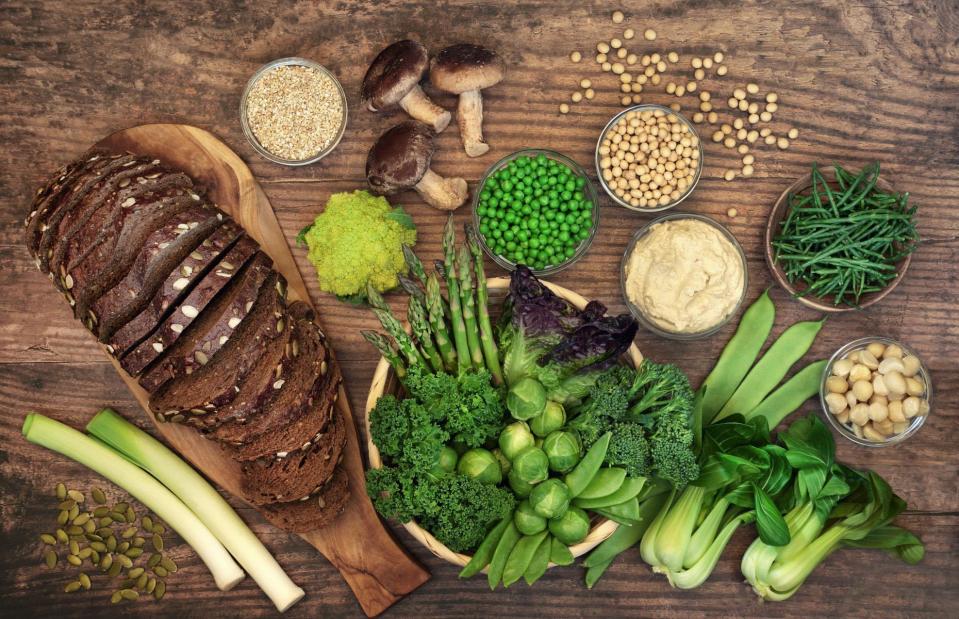
marilyn barbone/Shutterstock
When it comes to fuelling our bodies efficiently, we should aim to create a gentle and sustained increase in blood glucose, followed by a similarly graceful and stable decline. Low glycaemic index (GI) foods are perfect for this; if your sugars are coming from non-starchy vegetables like leafy greens, or from legumes and pulses, citrus fruits or whole grains, the fibre content will slow your sugar absorption to a gentle curve. White carbs, sugary drinks, confectionery and sweet bakes will create a pronounced spike, which is problematic.
Food becomes fuel

Andrey_Popov/Shutterstock
Sugar has been prized by humans since ancient times, and it's all thanks to the boost of energy it gives to our bodies. Carbohydrates power our cells and help us get stuff done, and research suggests that our bodies can store up to 2lb 4oz (1kg) of glucose – about two days' worth of energy – in our muscles and livers. However, Mays says the impact on blood glucose levels comes down to a whole host of personal factors, with our physical health, sleep quality, exposure to stress, activity levels, genetics and hormones all playing a part. The rise of small and affordable continuous glucose monitors is helping more people understand their own personal reactions to sugar.
You may feel a rush

siamionau pavel/Shutterstock
A sudden influx of refined sugar causes a sharp spike in the glucose circulating in the bloodstream; meanwhile, a lower GI food will create a steadier rise. Either way, it's now that the body starts to produce insulin – a hormone that Diabetes UK describes as being "like a key that helps unlock your cells, and lets glucose in your blood move into your cells where it is used for energy". Once inside your cells, glucose can be oxidised, or 'burnt', to fuel your movements. Just had a can of cola? Your pancreas will be pumping out a lot of insulin, telling your cells to absorb the glucose for energy.
The sugar high feels good

AndrejRutar/Shutterstock
You'll probably feel some short-term benefits following an intake of sugar. If you're feeling weak from a shock, exhausted after a night of broken sleep or ravenous after a spell without food, a boost in glucose – and the accompanying dopamine – is a quick mood-lifting fix. A 2016 University of Cincinnati study found that high-sugar foods can curb our psychological and physiological experience of stress, which is why chocolate and other sweet foods are often viewed as emotional first aid.
Half our glucose is burnt by our brain

Pheelings media/Shutterstock
Our brain is our most sugar-hungry organ, using around half of our body's glucose. The carbohydrate powers all its normal functions: thinking, controlling our body's processes and powering our memory, vision and more. The problem is that the brain has no storage facility for glucose; it depends on a steady supply from the rest of the body. When glucose really dips, we experience brain fog and headaches. However, a mixed bag of research shows there may be some longer-term cognitive benefits from following a keto diet that severely restricts carbohydrates.
Now's the time to exercise

Prostock-studio/Shutterstock
Research into post-meal glucose levels tells us that exercising during this time causes muscle contractions, which increase the amount of glucose being drawn out of our blood. Maintaining what researchers call 'high glucose availability' during exercise can delay fatigue, resulting in a better physical and cognitive performance. In fact, we can't perform for long at high intensity without top-ups, which is why glucose and dextrose drinks and gels are so popular among athletes. Exercise is a helpful way to control blood sugar and increase the effectiveness of insulin, so is often recommended for people with type 2 diabetes.
The high quickly fades

Maly Designer/Shutterstock
"On average, our glucose levels drop after about 20 minutes," says Mays, adding that this is when we'll start to feel unfocused and more easily distracted. We can also experience a mood crash, with our short-lived dopamine high dropping off to leave us feeling sluggish, irritable and disinterested. This is commonly experienced as the afternoon slump that can follow a big carby lunch. "You'll probably want more sugar and caffeine to lift your mood, so it's a vicious cycle," adds Mays.
The yo-yo effect can be a big problem

Pressmaster/Shutterstock
Fluctuations in blood sugar can have some other immediate effects, too. The normal action of our insulin and glucagon (a hormone that can raise blood glucose) keeps us on a steady course, but some research suggests that low blood sugar could be the cause of hot flushes in menopausal women. It can also cause anyone to have reduced concentration levels, feel 'hangry' or even experience shaking. Diabetic people can suffer from increased thirst, headaches, tiredness and blurry vision in the short term if their high blood sugar goes unchecked.
Excess sugar has to go somewhere
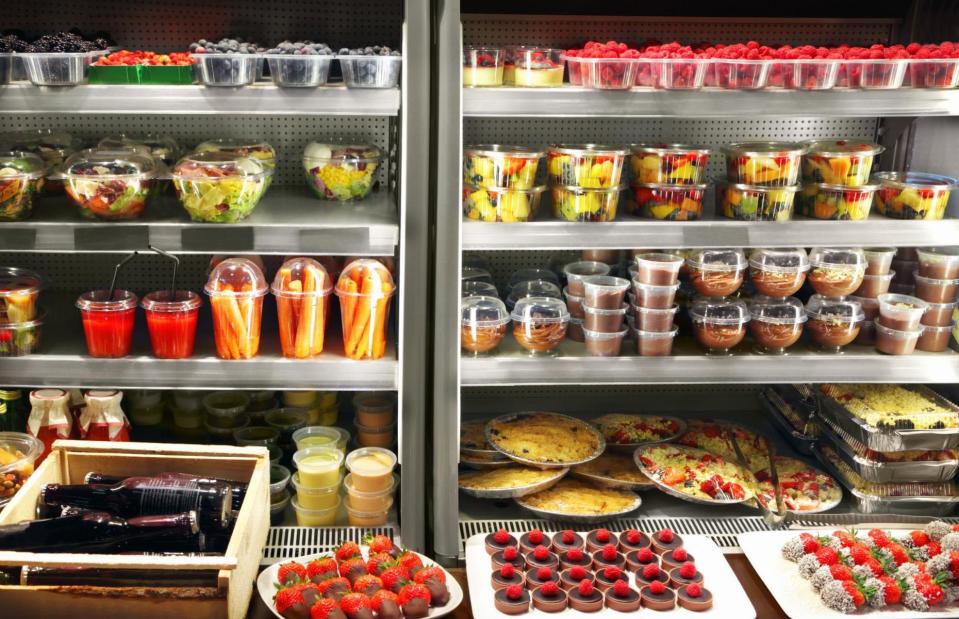
Adisa/Shutterstock
Only a limited amount of glucose can be stored healthily in our muscles and liver – and few of us pull on our trainers after every meal. So what happens to the sugar our cells don't use? Mays explains that, once our bodies have turned some of it into glycogen for future use, the rest ends up in our tissues as fat, or accumulates in the liver. The excess fat is stored either under our skin (as adipose fat) or around our organs (as visceral fat). It's the latter kind of fat that can be the most problematic, as it produces hormones and chemicals that can be toxic.
The ill-effects start to build

Santhosh Varghese/Shutterstock
Emotional effects can snowball, too. Besides the short-term impact of a sugar crash on our mood, we might also start to experience further negative consequences. Studies have found a link between higher sugar intake and depression and mood disorders, particularly in men. A University of Kansas review in 2019 suggested that high consumption levels can pose a significant threat to psychological wellbeing.
Sugar suppresses your immune system

Ground Picture/Shutterstock
When we're feeling run down or are struggling to shrug off a lingering virus, a sugary boost can feel like a good idea. Many people reach for sugary drinks to fuel them through a bout of sickness, but research shows that all forms of sugar (whether in the form of sucrose, fruit juice or honey) decrease the activity of white blood cells that engulf bad bacteria. In the study, immune suppression occurred as quickly as 30 minutes after a meal, with ill effects observed five hours after eating.
The pancreas struggles to cope

zedspider/Shutterstock
Think of your pancreas as a very sensitive set of scales, calibrated to weigh diamonds or precious metals. This gland produces the enzymes needed to digest your food and also releases insulin and glucagon, which control the glucose in our blood. Now imagine repeatedly dropping heavy bags onto those scales, and consider the damage it would do. "The pancreas becomes overwhelmed by an excess of glucose, so it just can't release enough insulin to deal with it," says Mays.
This can cause diabetes...
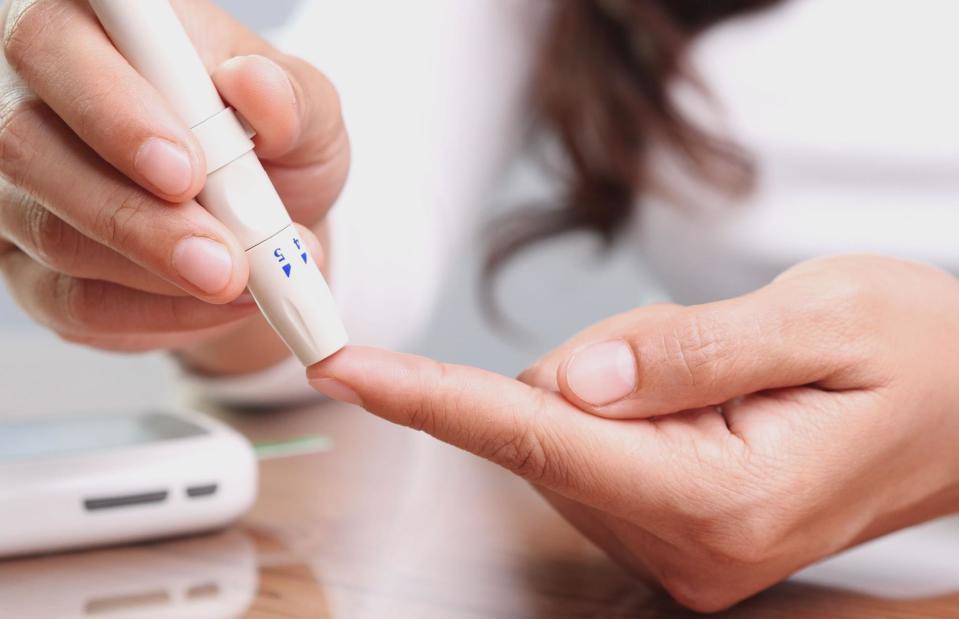
iHumnoi/Shutterstock
As your body tries to get rid of excess glucose, you may need to urinate more. This is just one symptom of type 2 diabetes, a condition where the pancreas no longer produces sufficient insulin, or where the cells in the body have become resistant to its effects. People with diabetes need to control their blood sugar carefully through diet and medication; poorly monitored glucose can cause damage around the body, leading to kidney problems, eyesight issues and an increased risk of heart disease or stroke.
...but there is a way back

Halfpoint/Shutterstock
The good news is that working to improve your diet – and increasing exercise – can reverse some of these negative effects. A 2016 Newcastle University study found that even people who have lived with type 2 diabetes for up to 10 years can experience complete remission, generally by adopting a low-calorie diet and losing excess weight. According to Diabetes UK, losing visceral fat is important to help your liver and pancreas start functioning well again.
High blood glucose can send your immune system into overdrive

GlenBerlin/Shutterstock
Another problem with high glucose in the blood is that it causes our body to respond by upping its alert level. Inflammation is our bodies' first natural response to illness, injury and infection – but if the alert level never decreases, our immune systems go into overdrive, causing problems all over our bodies. Inflamed regions of the body are unable to operate normally, and the impacts are far reaching. As such, discovering more low-GI foods to enjoy is a good way to protect your general health.
It can cause joint pain – and worse
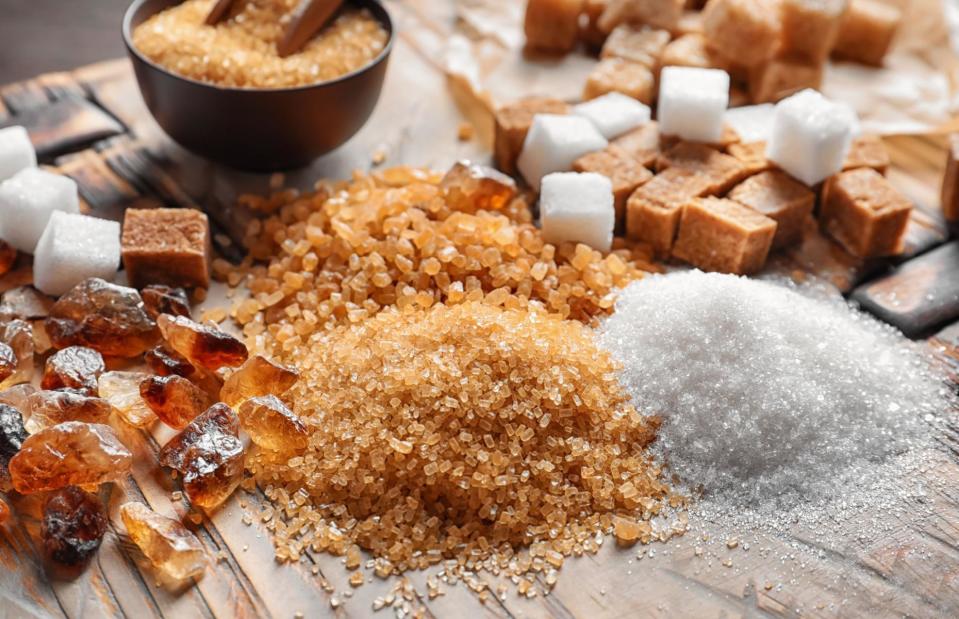
New Africa/Shutterstock
As the body's normal functions are impacted, inflammation can manifest itself as joint pain or digestive problems – and it can also trigger some serious and chronic long-term conditions, such as inflammatory bowel disease, endometriosis, hardening of the arteries (atherosclerosis) and rheumatoid arthritis. As such, cutting your sugar intake is always recommended to help lower inflammation in your body. Researchers have even looked into whether blocking sugar receptors on the lungs could ease inflammatory conditions like asthma.
Sugar's impact on your skin
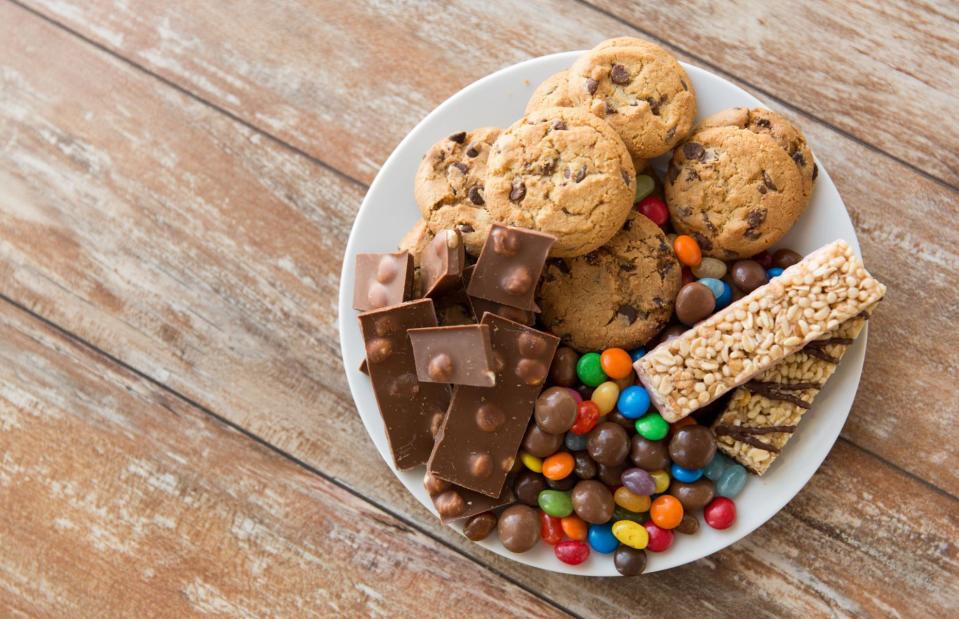
Ground Picture/Shutterstock
Even at a lower level, inflammation can make life uncomfortable. Research suggests that Western diets in general – higher as they are in sugar, fatty foods and dairy products – are triggers for skin conditions like adult acne and psoriasis. In fact, a 2020 University of California study found that psoriasis may be a more immediate consequence of a sugary diet than weight gain. "Eating an unhealthy diet does not affect your waistline alone, but your skin immunity too," says the study's lead author, Zhenrui Shi.
Good glucose control slows brain ageing

Rimma Bondarenko/Shutterstock
We've mentioned how fundamental glucose is to the function of the brain, which controls and maintains the essential workings of the body. Fuelling it correctly, though – and avoiding sugar spikes – is important to protect its ongoing health. The inflammation that comes along with a sugary diet has been proven to cause brain fog in the short term, but there are more serious consequences, too. A 2022 study found that type 2 diabetes can make the brain age up to 26% faster than in cases where good glucose control has been exercised.
Excess sugar can impact memory

VAKS-Stock Agency/Shutterstock
You may feel more alert when you've had a sugary fix, but a 2013 study by the American Academy of Neurology suggested higher levels of blood glucose are unhelpful when it comes to cognitive functions such as memory. A US study testing the memory and recall of over 60s found that those with lower blood sugar performed better. “These results suggest that even for people within the normal range of blood sugar, lowering their blood sugar levels could be a promising strategy for preventing memory problems and cognitive decline as they age," study author Agnes Flöel told academic journal Neurology.
Your gut bacteria can take a hit

SewCreamStudio/Shutterstock
Our microbiome – the collection of bacteria, fungi and viruses that live naturally in our bodies – is crucial for our digestive and immune systems to stay healthy and synthesise essential vitamins and amino acids. Sugar can threaten this, according to studies. A 2022 report by Columbia University Irving Medical Center found that the presence of sugary foods in our small and large intestines can disrupt this precious colony of microbes. While some carbohydrates (for example, the inulin found in raw onions, leeks and Jerusalem artichokes) feed our healthy bacteria, a diet high in sugar eliminates some of these beneficial microbes, leading to a greater risk of metabolic disease and pre-diabetes.
Maintaining the right balance

Ground Picture/Shutterstock
Scientists have long sought to better explain the link between a sugar-rich diet – particularly one filled with added sugars and sugary drinks – and the many conditions that shorten life expectancy. Some have studied the link between sugar intake and cancers, while others have looked at stroke and heart disease or obesity. The results are clear: exercise is essential when it comes to glucose control, while the more of our calories we get from sugar, the worse it is for us and the lives we want to lead.
Now discover 25 vitamin D packed foods that will boost your health during the darker months


